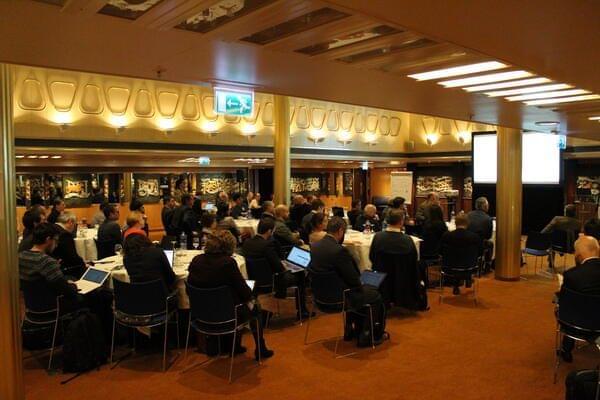
Observational health data holds the power to provide new insights in the clinical field, but in a European network with varying data ontologies, data structures and IT-systems, this proves to be a challenging task. To tackle this issue, a shift in the technological implementation of data standards in healthcare is required. Needless to say, attempting to solve this issue single-handedly would be practically impossible; a collaboration between countries and institutions is essential to guarantee far-reaching effects in Europe.
To this end, the European Health Data and Evidence Network (EHDEN) was founded.

EHDEN Objectives

Last week, The Hyve together with 21 different partners from industry and academia joined forces for the official EHDEN kick-off event at the SS Rotterdam, a former transatlantic cruise ship.
EHDEN is lead by Peter Rijnbeek from Rotterdam’s Erasmus MC and Nigel Hughes from Janssen Pharmaceuticals, and supported by the Innovative Medicines Initiative (IMI2). Preparatory actions set into motion in the fall of 2018 – read more about the launch and our involvement in the project in this blog.
The EHDEN consortium has set out to achieve three main objectives:
- Implementing a federated health data network in Europe.
- Enhancing the data supply and demand to form a health data ecosystem in compliance with privacy legislation and ethics.
- Enabling the development of new and augmented health services in order to improve healthcare outcomes.
These ambitious aims revolve around what is arguably EHDEN’s core point: creating a network wide standardisation to the OMOP common data model and the implementation of OHDSI’s analytical tools. To stick with the kick-off’s nautical theme, one can think of the tools as the ship’s engine, where the engine is fueled by data, and driven by the stakeholders’ use cases.
Towards efficient technical implementation

The Hyve will join forces with Janssen to lead the Work Package 4responsible for the EHDEN’s technical coordination and implementation. Kees van Bochove, The Hyve’s CEO, highlighted that our current expertise on the OHDSI tooling, the OMOP common data model, as well as on FAIR principles, will play a key role in the deployment of a fully integrated European data network framework. The overall implementation will follow a modular approach, adapted to the researcher’s use cases, and in compliance with security, privacy, data interoperability, data quality, and reproducible harmonization standards. Prior collaborations in other IMI projects in which The Hyve has been involved, such as Big Data@Heart, Big Data for better outcomes, and PIONEER, will determine the overall development starting point.
OHDSI tools in action
To quote Patrick Ryan from Janssen, main collaborator on OHDSI, “EHDEN will catalyze the usage of OHDSI”. In line with Patrick’s message, Daniel Prieto-Alhambra, professor of Pharmaco- and Device Epidemiology at the University of Oxford, presented results from the first European-based OHDSI study-a-thon. The study was highly ambitious: in only 1 week, the team wished to answer a research question and prepare a submission paper using observational data in the OMOP common data model and the OHDSI tooling. The aim of Prieto-Alhambra’s team was to compare the postoperative complications risk and long-term implant revision between unicompartmental knee replacement and total knee replacement. The collective effort turned out to be a success story that fascinated the whole audience and pinpointed the power of a community call from the OHDSI community. To know whether or not this 1-week study based on observational data will predict the results from it’s twin TOPKAT clinical trial, we will need to wait until the trial ends.

During the EHDEN kick-off, participants got an overview of various OHDSI tools through quick 15 minute demos. One demo was hosted by The Hyve’s Maxim Moinat where he showcased the ETL tooling that is available in OHDSI. Other demos included a rundown of Atlas, shown by Patrick Ryan, an introduction to ARACHNE by Greg Klebanov from Odysseus, an overview of the patient-level prediction tools available in OHDSI by Ross Williams from the Erasmus MC, and a demonstration of the EMIF data catalogue by José Luis Oliveira from the University of Aveiro.
Future directions
EHDEN presents an exciting opportunity for the digital transformation of healthcare in Europe. To safeguard sustainability and reusability of the technological framework, all EHDEN stakeholders will carry out the project following a transparent and reproducible data flow. Following a modulation of the OMOP common data model and the OHDSI tools to fully accommodate European standards, the value of observational data will be strengthened. Therefore, the EHDEN outcomes will play a key role in clinical decision making, improve the usability of real world data towards real world evidence generation, and even enable the usage of predictive clinical decision models in medical practice in the near future.
Stay tuned for the latest news of EHDEN via Twitter, LinkedIn, or Github. Next stop: European OHDSI Symposium, 29-31 March 2019 in Rotterdam.
Funding statement and Disclaimer
This project has received funding from the Innovative Medicines Initiative 2 Joint Undertaking (JU) under grant agreement No 806968. The JU receives support from Horizon 2020 - The EU Framework Programme for Research and Innovation, and EFPIA.
